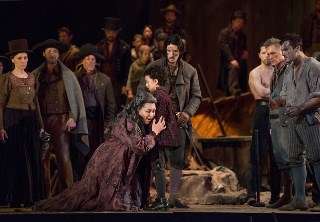|
Back
Rachvelishvili Soars! New York
Metropolitan Opera
01/22/2018 - & January 26, 30, February 3, 6, 9,12, 15, 2018
Giuseppe Verdi: Il trovatore
Stefan Kocán (Ferrando), Sarah Mesko (Ines), Jennifer Rowley (Leonora), Quinn Kelsey (di Luna), Yonghoon Lee (Manrico), Anita Rachvelishvili (Azucena), Edward Albert (A Gypsy), David Lowe (Messenger), Eduardo Valdes (Ruiz)
The Metropolitan Opera Orchestra and Chorus, Marco Armiliato (conductor)
Sir David McVicar (production), Charles Edwards (sets), Brigitte Reiffenstuel (costumes), Jennifer Tipton (lights), Leah Haussman (choreographer), Daniel Rigazzi (revival state director)

(© Karen Almond)
Sir David McVicar is well astride his path to becoming the closest thing the Met has to a house director. In the dead of an unusually cold winter, one might ask how much gloom New York can stand after coursing through his dark, subdued productions. Alongside his new production of Puccini’s Tosca, which premiered on New Years’ Eve and replaced the late Luc Bondy’s baleful effort, we have a revival of his gritty, Napoleonic-era production of Verdi’s middle period masterpiece – often called “the last bel canto opera.” McVicar’s mostly disappointing double bill of Mascagni’s Cavalleria rusticana and Leoncavallo’s Pagliacci is also currently running in a revival. Sir David’s Trovatore has been with us for nearly a decade now and it limps along, lifeless, tired, lacking any innovation. Poor stage direction by Daniel Rigazzi reduced scenes of great passion to tawdry slapping fights, provoking laughter from the audience. And that huge gray wall – the “battleship” whose appearance famously outraged the Sig Ruman character in the Marx Brothers’ A Night at the Opera – still stands.
The opera’s last outing in the 2015-2016 season tore at the hearts of New Yorkers. It marked the last fully staged Met appearances of the late Russian baritone Dmitri Hvorostovsky, who died last October and appeared in the first three performances before undertaking treatments for the brain tumor that ultimately claimed his life. Opposite Anna Netrebko, one could scarcely have asked for a better performance anywhere in the world. This year’s revival is not as great a vocal success, though it did mark the first appearance of the rising Georgian mezzo-soprano Anita Rachvelishvili in her Met role debut as Azucena. Cold, somber tones and delicious low notes purred from this exciting singer, who was alone among her colleagues in receiving a standing ovation at the final curtain calls. Magical transitions ranged from piano expressions of intimacy to blossoming fortes of horror to keep the audience riveted. Her voice is one for the ages, and indeed recalls the best Golden Age singing.
Among the other soloists, Quinn Kelsey’s di Luna stood out for its majesty. Already a renowned Verdi baritone, he may well rise to fill the shoes of the late lamented Hvorostovsky. The Korean tenor Yonghoon Lee sang an energetic Manrico that occasionally had limits but often commanded the stage. Jennifer Rowley suffered in the part of Leonora, which was originally announced for the soprano Maria Agresta. Rough attacks marred most of her scenes, though she occasionally produced pleasant modulations and contributed well to ensemble passages. Bass Stefan Kocán’s Ferrando was serviceable.
One might have hoped for better conducting than the languid broadbrushing of Marco Armiliato. The choruses, so important in this opera of war, showcased the Met’s ensemble as one of the world’s best.
Paul du Quenoy
|